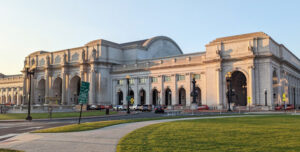
By Julius Washington, Howard University News Service
Special to The Truth
Freight rail employee unions and company officials reached a deal early Thursday, following 20 hours of marathon talks, ending fears of a nationwide strike that would compromise shipments and further disrupt public transportation.
Members of the Biden administration had been involved in negotiations for months and proposed a measure to break the standstill between the unions and rail companies in July.
On Wednesday, with no resolution in sight, Senate Republicans floated a proposal to force the rail workers to accept the contract proposed by the Biden-appointed board, but it was ultimately stopped by Sen. Bernie Sanders, who said in a statement, “I am proud to have blocked those efforts.”
In a tweet from his official @POTUS account, President Biden took a victory lap on the negotiations’ success, stating “This is a win for the economy and for the American people.”
The United States has one of the most extensive freight rail networks in the world, covering nearly 140,000 miles of track and making up an $80 billion industry.
Tanya Penny, director of Howard University’s Center for Excellence in Supply Chain Management, pointed out just how catastrophic a potential strike might have been.
“About 40 percent of our cargo in the U.S. travels by rail so it would have been a disaster,” Penny said. “I’ve seen estimates in the billions of dollars, in terms of impact.”
While strikes and shortages have occurred in the past, Penny says that a railroad strike would have been particularly troublesome. “The issue here is that we already have so many supply chain challenges.”
“You can’t necessarily move from train to truck, because there’s not enough truck drivers to do that,” Perry said. “There’s already issues going into the ports, so the ability to go from one mode of transportation to the other is limited.”
Thomas Batties, an Amtrak passenger at Union Station in Washington, voiced some of his fears about the potential supply chain issues. “It just was not the right time for other disruptions to our everyday life to happen and cause further inflation,” Batties said. “That was my fear, and probably everyone else’s as well.”
The freight strike’s impacts would have been felt far beyond cargo shipments and supply chain disruptions, however. Amtrak, the nation’s largest passenger rail agency, owns only 3% of the rails it uses, mainly within the bustling Northeast Corridor. Freight rail operators, including CSX, BNSF and Union Pacific, operate the majority of the nation’s tracks.
A potential strike would have snarled Amtrak’s long-distance passenger rail, and as such, the railroad preemptively canceled its long-distance lines, beginning Tuesday, offering passengers refunds and waiving the difference in fares booked before Oct. 31.
Following the announced deal, Amtrak said it was “working to quickly restore canceled trains and reaching out directly to impacted customers to accommodate on first available departures.” But as of the time of its scheduled departure out of Union Station, the overnight Crescent route to New Orleans remained canceled.
At Union Station, the second-busiest station on the Amtrak network, some passengers expressed concerns about the status of their ride that day.
Batties, who was traveling with his son and daughter, indicated that he was worried before hearing that the Northeast Regional was unaffected.
“We’ve got a very important trip,” he said. “I was happy to hear last night on the news that the Northeast Corridor short-track activity was going to be OK.”
While Batties was concerned about his travels, he was also sympathetic to the complaints of the union members.
“It sounds like unfair treatment of the employees that they didn’t get sick time and other benefits, or treatment that normal workers get … really sounded like stuff that was going on in the ’50s, and not 2022,” he said.
Another traveler, Jeremiah Johnson, an office worker who commutes between New York and Washington on Amtrak, echoed those sentiments.
“At the same time, I’m hoping the workers are getting a fair shake, getting paid their worth,” Johnson said. “We want the workers that are maintaining and taking care of this important infrastructure – that they’re well taken care of.”
At the end of the day, some passengers were generally unfazed by the potential strike’s impact on their travels.
“I’m interested in reading up on how it turned out today, but selfishly, I am relieved it’s not affecting my travel plans at all,” Johnson said.
Julius Washington is a reporter for HUNewsService.com.
